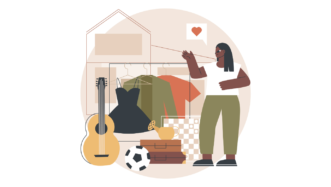LESSON OVERVIEW
The lesson is a series of stand-alone common verbs exercises that can be used as a revision, warm-up or time filler. There are five exercises that deal with different common verbs, collocations, phrasal verbs, opposite verbs and phrases with ‘get’. Each exercise has an extension for more practice.
B1 / Intermediate60 minStandard LessonUnlimited Plan
PHRASAL VERBS
In this common verbs exercise, students choose the best option out of three phrasal verbs (e.g. look it up/pick it up/work it out in a dictionary) to complete pieces of advice. When students finish the task, a teacher can ask them to agree or disagree with the advice and give their own advice.
COLLOCATIONS
In this exercise, students complete two sentences with the same verb. Sentences contain collocations like ‘spend money’, ‘do the laundry’, ‘make a decision’, ‘have fun’, etc. After students complete the statements with common verbs, they choose the ones that are true for them and add more details.
COMMON VERBS + PREPOSITIONS
In this exercise, students complete the points with correct prepositions. The exercise contains the common verbs with prepositions like ‘pay for’, ‘apologize to’, ‘worry about’, etc. There are also some points that don’t need a preposition. When students finish the task, they choose some of the points and talk about them.
OPPOSITE VERBS
This exercise focuses on some common verbs that often have opposite meanings (e.g. win – lose, give – take, pass – fail, etc.). Students complete the gaps in stories with two opposite verbs. After students complete the gaps, they can choose a few pairs of opposite verbs and create similar short stories using both verbs.
VERB PHRASES WITH ‘GET’
This common verbs exercise is similar to a crossword puzzle. Students complete the sentences with missing words by putting letters in boxes. The phrases from the sentences are ‘get dressed’, ‘get rich’, ‘get stuck’, ‘get better’, etc. Students also complete one more phrase with ‘get’ from the letters in green boxes and create two sentences with it.
Subscribe to unlock these and many other Standalone lesson lesson plans with the Unlimited planWORKSHEETS














This lesson is great, can we have more like this please? ideally a B2-C1 version would be fantastic.
Thanks, I’m happy to hear that 🙂 You can check out our other standalone worksheets here.
As well as being a very useful lesson plan for revision, all the exercises are wonderfully laid out and engaging for students. Thanks!
Thank you so much for such positive feedback 🙂
Hi, thanks for the sheets, however in the collocations exercise only a single word is highlighted (and collocations are two or more words), in some of these examples I can’t find what the collocation is, could you clarify what the full collocation is in each of the sentences please?
Hi! In the teacher’s version of this exercise, we only highlighted verbs that students are supposed to complete (the answers). The collocations in each sentence include the verb that students complete, e.g. A: do homework/do laundry, B: spend time/spend money, etc. Can you clarify in which sentences you can’t find what the collocation is?